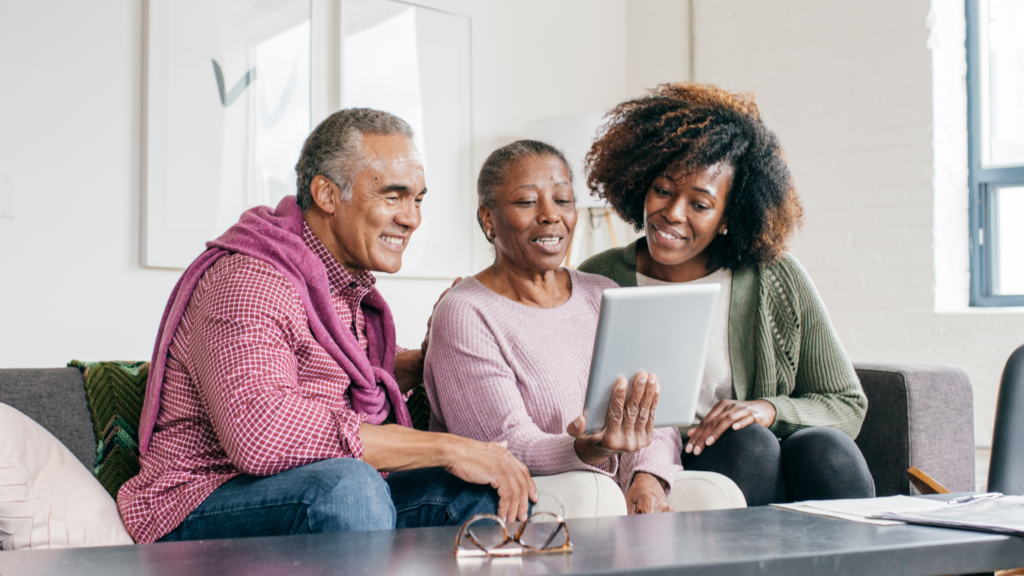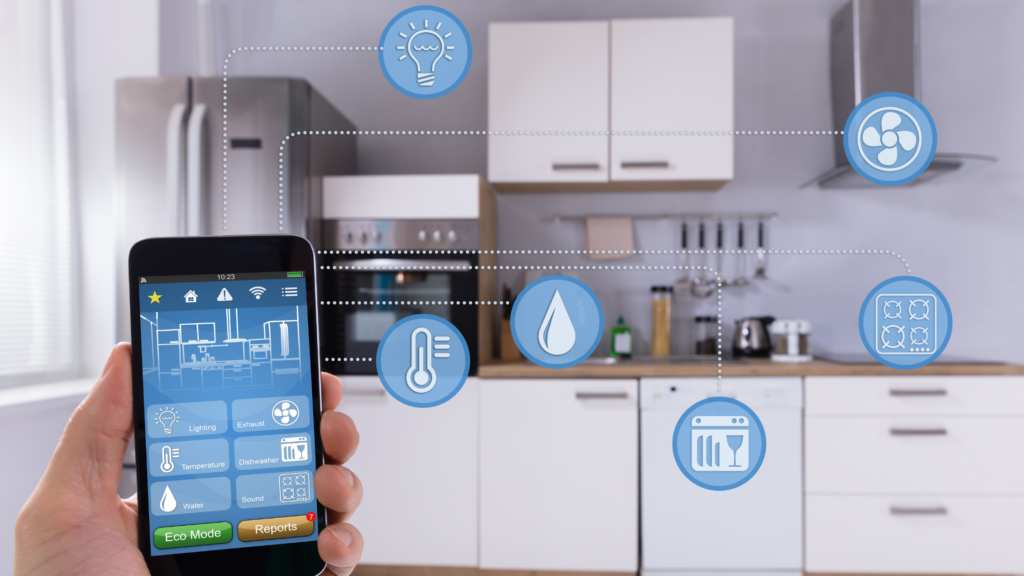When one of my family members recently fell ill, my husband and I got a lesson in how unprepared we truly were. This family member was vomiting and coughing so hard he briefly blacked out. We wanted to call 911 to get him to the ER, but he refused. So, we rushed over to his condo to take him to urgent care.
Here is what we learned:
- We did not have a way to get into his gated community.
- He had his medications and doctors written on a piece of paper that was not up-to-date.
- He was not actually sure what happened, only that he was coughing and then ‘woke up a little while later.’
This was pretty close to our worst nightmare. Fortunately, after a visit to urgent care and many hours in the ER, we found out it was just a bad cold (not a heart attack as we feared). But it also taught us that we needed to do more to keep this family member safe in his home.
I know many people are in this same boat with parents, grandparents, aunts, and uncles. This is where technology can help. It is time for us to make our parents’ homes ‘smart.’

What is a ‘smart home’?
The term ‘smart home’ sounds fancier than it is. It is really just adding devices to your home that you control remotely. So if you have Amazon’s Alexa or Google Home, you already have the beginnings of a ‘smart home.’
To make your home smarter, you can add devices that help automate things like temperature, energy use, and lighting. Smart devices can ‘talk’ to each other to complete a task.
For example, when your mom gets up in the morning, a sensor could realize she is moving, turn on the lights in the bathroom, and send her a text reminder to take her medication.

Some typical ‘smart home’ features are:
- Security devices: Video cameras, smart locks, and alarm systems.
- Automation: Devices that can open and close doors, start music, or keep track of groceries.
- Energy savers: Smart thermostats, lights, and power outlets that can shut off at specific times.
Most ‘smart home’ devices can be controlled with a mobile app from anywhere you happen to be.
Why is a ‘smart home’ helpful for seniors?
Most people hope to stay in their home as they age. According to an AARP survey, three-out-of-four adults over age 50 want to stay in their homes.
A ‘smart home’ can help older adults stay independent even as they become physically less able to do things. For example, devices like ‘smart locks’ allow seniors to lock and unlock doors without having to physically get up, and video doorbells let them see who is ringing.

Your parents may be uneasy about having a bunch of new technology in their home. To get the conversation started:
- Point out how the technology helps them. If they can see what they get out of it, they are more likely to get on board.
- Make it a conversation, not you telling them what to do. No one likes being bossed around in their home.
- Pick devices that are simple and easy to use.
- Write down any instructions for using the technology.
A guide to making your parents’ home into a ‘smart home’:
Since everyone is different, it is easiest to think about making your parents’ home smart by looking at each issue they have.
Issue #1: Mobility
Mobility – being able to move around – is one of the biggest issue people face as we age. Having difficulty walking, getting up from sitting, and doing things around the house limits how much older adults can do for themselves.
Solution #1: Voice-activated devices
Every ‘smart home’ needs a device that is the central hub for all other devices. If that device is voice-activated, your parents can control everything connected to it. Amazon’s Alexa, Google Home, Samsung Smart Things, and soon Apple’s Siri are all examples of voice-activated central hubs.
From there, you can connect other smart items your parents can control with their voice. For example you can tell smart light bulbs when to turn on and off – think of these as the new ‘clapper. There are also smart plugs that will allow your parents to plug in appliances that they can turn on and off with their voice.
Issue #2: Forgetfulness
It is not unusual for people to become forgetful as we get older. The fear is that forgetting to turn off the stove could lead to an emergency.
Solution #2: Smart ovens, automatic shut-off devices, and smart alarms
If you are worried about the stove being left on, there are several options:
Option 1: Smart ovens can connect to Alexa, Google Home, wifi, or Bluetooth. You control turning them on and off, which can be helpful if you worry the stove was left on accidentally.
Option 2: Automatic shut-off devices added to existing stoves. They use motion sensors to decide if the oven is still on and turn the oven off after a set time.
Option 3: There are also smart smoke and carbon monoxide detectors, like Nest Protect. This type of detector really is smarter. It speaks to you and sends alerts to your phone instead of just sounding an alarm, and tells you what was detected (smoke or carbon monoxide) and in which room. It also tests itself on a regular basis and lets you know when there is a problem.

Issue #3: Falling
One in four older adults falls each year, and of those falls one in five causes a serious injury like a broken bone or head injury. Falling is one of the biggest causes of seniors losing their independence.
Solution #3: Smart lighting and medical alert systems
One of the main causes of falls is seniors having trouble seeing where they are going. To help with preventing falls, add smart lights connected to motion detectors in hallways and bathrooms. Making sure your parents have some way to get help if they do fall is also important.
Many older people do not like medical alert necklaces because the ‘I’ve fallen and I can’t get up’ lady makes them feel old. But medical alert systems have gotten more sophisticated in recent years. Many have features that look more like the latest smartwatch than the clunky necklace.
If you parents will not go for that idea, newer smartwatches like the Apple Watch have fall detection built in as a feature. If the senior is able to speak after they fall, Alexa or Google Home could also support them calling for help.
Issue # 4: Security
Helping older adults to stay safe involves decisions about who to keep out as well as who to let in. Imagine needing to get to a family member, but finding yourself – or someone you sent to help them – locked out.
Solution #4: Smart security systems, smart locks, smart doorbells
Home security has advanced so much in recent years that there is a wide variety of systems to choose from. Most smart security systems include motion sensors, door and window sensors, and security cameras. Many of them, like SimpliSafe and Honeywell, are so simple you can install it yourself.
You can also install smart locks on doors that you can open and close with your phone. Your parents can monitor who is coming and going, and assign special access to friends and family. Finally, video doorbells are a way for your parents to see who is ringing, and speak to them.

There are smart home devices I did not mention.
So far we have covered smart devices to help with common issues for older adults. You may be wondering about all of the other smart devices out there.
What about smart refrigerators that tell me what groceries are needed? Do you recommend robot vacuums? How could you forget to mention ‘smart thermostats’ – they save so much $$$?!!
These are all great smart devices. But I consider these ‘nice to have’ rather than specifically helpful to address what seniors need to live independently. Get all the touch-less faucets, microwaves you can speak to, and disco-lighting on demand you want.
Just make sure you also get the stuff your parents actually need.

Systems that put the ‘smart home’ together for you.
If everything described above sounds like a lot, there are systems that bring all of this together for you. Companies like AT&T have pages about smart homes and products they connect together.

If you happen to live in Nashville, Tennessee, there is a startup named HoneyCo Homes that sets up custom smart home solutions for seniors in that area. And, if you want more product recommendations than what I listed, check out Smarthome.com for a wide selection of devices you can order from their site.

Key Takeaways:
‘Smart homes’ are ones that use devices to help automate and remotely control different things. This can be lighting, turning the oven on and off, and unlocking the front door. For seniors, a smart home can mean the difference between staying independent or not.
Some key areas to create a smart home for the seniors in your life:
- For mobility issues – get voice activated devices.
- For forgetfulness – avoid calling the fire department and get smart ovens, automatic shut-off devices, and smart alarms.
- If falling is a problem – look at smart lighting and medical alert systems
- To make sure their home is secure – check out smart security systems, smart locks, and smart doorbells.
Hopefully this guide helps to highlight the items that are most important for supporting seniors. The key thing is for older adults to be as independent as they are able.






“Smart Homes” are likely going to become a more common thing throughout the years, especially with older people. They are to help the elderly stay at home, rather than having to live in a nursing or assisted living home. The “smart home” can be as easy as unlocking and locking doors for them, turning on and off lights, and sending reminders to take their medication, as stated above.
While I was reading the article, I totally agree with the issues that can happen to seniors. I have a grandmother who has Alzheimer’s disease. One day she fell down and she broke her heap. And she forgot that she fell down in the bathroom. She did not tell us but she was still in pain. Like in this case, a Smart home would be good solution not only for forgetting something but also for having injuries by falling. I learned about the Smart home in technology class. It does not only give convenient life to elder people but also helps problems of injuring, So I think it is also good for patients likewise Sars can support our help.
Thank you for commenting, Byeonggil! And I am sorry to hear about your grandmother. This sort of technology can certainly help, especially for seniors who want to remain at home and be safe.
The article addresses what any son/ daughter would want what’s best for their parent’s health, being able to have a support system that will always be there for you if in need of an emergency or just remind you to get more carrots at the grocery store. The older we get the harder it is to remember things, having my mother go through some of these stuffs because my grandparents’ house was in a ranch about an hour away from our house. It is very dangerous not to have anything to guide them while they are alone. It is reasonable and makes a lot of sense to add technology to your homes to always have an extra eye and make sure your love ones are safe and in the best health. The article also gave some good points to use while talking to my family and giving them good reasonings to get them.